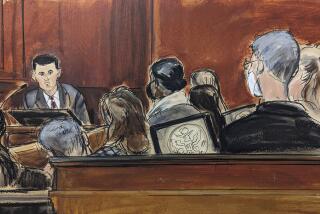Regulator Tells of Lincoln’s Risky Deals : Keating trial: Official testifies that S&L; was prime candidate to fail with “grossly inadequate” assets to cover potential losses.
- Share via
LOS ANGELES — William K. Black, a top federal thrift regulator, testified Monday that he agreed with West Coast thrift examiners in the summer of 1986 that Lincoln Saving & Loan’s risky ventures and overall condition were bad enough to warrant putting the Irvine-based institution into conservatorship.
Testifying in the state securities fraud prosecution of Lincoln owner Charles H. Keating Jr., Black said on cross-examination, however, that he had nothing to do with the federal examination of Lincoln, which ultimately was seized in April, 1989.
He said he based his opinion on his review of reports from examiners and summaries they prepared of Lincoln’s response to regulatory concerns.
Black first reached his opinion about Lincoln several months before its parent company, American Continental Corp. in Phoenix, began selling bonds primarily to Lincoln customers at the S&L;’s Southern California branches. Thousands of those small investors were among bondholders who lost more than $250 million after the company and the S&L; collapsed.
Keating, 67, who was American Continental’s chairman, is accused in 20 counts of defrauding 22 small investors by disseminating false information and omitting material information, such as regulatory concerns about Lincoln’s financial health.
Black, senior deputy chief counsel for the Office of Thrift Supervision, became a key witness in fall, 1989, congressional hearings on Lincoln’s failure with his pointed and colorful characterizations of Lincoln and some of his own superiors in Washington. The hearings led to the resignation of M. Danny Wall as chairman of the Federal Home Loan Bank Board, the predecessor agency of the OTS.
But his attempt to re-create a bit of the lambasting, lecturing style of testimony that made him a hit at the House Banking Committee backfired Monday. Black was threatened with contempt by Los Angeles County Superior Court Judge Lance A. Ito for trying continually to elaborate on his answers and to provide answers when he wasn’t asked a question.
“We’ve spent two hours on laying a foundation and we’re not getting to the issues in the case,” Ito said after ordering the jury out of the courtroom. “Mr. Black is not helping us with his long explanations. . . . The jurors are getting bored, folks.”
The judge said Black’s answers were getting “more and more complex,” causing some jurors to roll their eyes at some of the answers.
When testimony resumed before the jury, Black soon got to the point.
Preliminary reports by federal examiners showed that by the summer of 1986, there were serious concerns over Lincoln’s transformation from a traditional thrift that made home loans to a high-risk operation that depended on less-stable assets: primarily direct investments in real estate and corporate securities, holdings of junk bonds and large loans for the acquisition, development and construction of real estate.
Combined with the S&L;’s fast growth--fueled by expensive and volatile brokered deposits--the risky assets made Lincoln a prime candidate for being one of the bigger thrift collapses. Its capital was “grossly inadequate” to cover potential losses from the risky ventures, Black said.
“My opinion was, we should do a conservatorship or receivership for Lincoln Savings as quickly as possible,” he said.
In 1987, Washington thrift officials rejected a recommendation from their West Coast examiners in San Francisco to seize Lincoln or impose heavy restrictions on is operations. At the time, Black was transferring from his job as director of litigation in Washington to take the top legal spot in San Francisco.
On cross-examination, defense attorney Stephen C. Neal attacked Black’s credibility, pointing out several instances in Black’s congressional testimony that were contradicted by other thrift officials. Black also acknowledged that he was critical of a number of top thrift executives in Washington.
Black resumes his testimony today.
More to Read
Inside the business of entertainment
The Wide Shot brings you news, analysis and insights on everything from streaming wars to production — and what it all means for the future.
You may occasionally receive promotional content from the Los Angeles Times.










